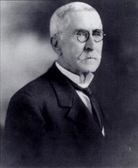William Hope Harvey
William Hope "Coin" Harvey (1851–1936) was an American teacher, lawyer, and politician, best known for his promotion of the Free Silver movement in the late 19th and early 20th centuries. Harvey was a key figure in the Populist Party, advocating for the unlimited coinage of silver, which he believed would alleviate the economic hardships of the time. His most famous work, "Coin's Financial School" (1894), played a significant role in popularizing free silver ideas and had a significant impact on the Silverite movement in the United States.
Early Life and Education[edit | edit source]
William Hope Harvey was born in Buffalo, Putnam County, Virginia (now West Virginia) on August 16, 1851. He pursued his education with a focus on law and became a licensed attorney, practicing in various states including Illinois, Missouri, and Arkansas. Harvey's early career was marked by his interest in education and law, but he soon became involved in economic issues, which would define his later work.
Career[edit | edit source]
Harvey's career took a pivotal turn when he became involved in the silver question, a major economic debate of the time. The Panic of 1893 and the ensuing economic depression heightened interest in monetary reform, and Harvey emerged as a vocal advocate for the free coinage of silver. His arguments were based on the belief that increasing the money supply through the coinage of silver would inflate prices, help farmers and debtors, and stimulate the economy.
In 1894, Harvey published "Coin's Financial School," a pamphlet that simplified and dramatized the argument for free silver. The work was immensely popular, selling hundreds of thousands of copies and making Harvey a household name. It depicted a fictional character, Coin, who explained the benefits of free silver to an audience, effectively disseminating Harvey's ideas to a wide audience.
Harvey's advocacy for free silver led him to become involved in politics. He supported William Jennings Bryan, a fellow silver advocate, in the presidential elections of 1896 and 1900. Although Bryan was defeated in both elections, Harvey continued to promote his economic theories and remained a prominent figure in the Populist Party.
Later Life and Legacy[edit | edit source]
In his later years, Harvey focused on other projects, including the establishment of a utopian community in Arkansas, known as Monte Ne. Despite his efforts, the community did not flourish, and Harvey faced financial difficulties. He continued to write and lecture on economic and political issues until his death on February 11, 1936.
William Hope Harvey's legacy is closely tied to the Free Silver movement and his role in popularizing its ideas. While the movement itself did not achieve its goals, Harvey's work had a lasting impact on American political and economic thought in the late 19th and early 20th centuries.
See Also[edit | edit source]
Search WikiMD
Ad.Tired of being Overweight? Try W8MD's physician weight loss program.
Semaglutide (Ozempic / Wegovy and Tirzepatide (Mounjaro / Zepbound) available.
Advertise on WikiMD
|
WikiMD's Wellness Encyclopedia |
| Let Food Be Thy Medicine Medicine Thy Food - Hippocrates |
Translate this page: - East Asian
中文,
日本,
한국어,
South Asian
हिन्दी,
தமிழ்,
తెలుగు,
Urdu,
ಕನ್ನಡ,
Southeast Asian
Indonesian,
Vietnamese,
Thai,
မြန်မာဘာသာ,
বাংলা
European
español,
Deutsch,
français,
Greek,
português do Brasil,
polski,
română,
русский,
Nederlands,
norsk,
svenska,
suomi,
Italian
Middle Eastern & African
عربى,
Turkish,
Persian,
Hebrew,
Afrikaans,
isiZulu,
Kiswahili,
Other
Bulgarian,
Hungarian,
Czech,
Swedish,
മലയാളം,
मराठी,
ਪੰਜਾਬੀ,
ગુજરાતી,
Portuguese,
Ukrainian
Medical Disclaimer: WikiMD is not a substitute for professional medical advice. The information on WikiMD is provided as an information resource only, may be incorrect, outdated or misleading, and is not to be used or relied on for any diagnostic or treatment purposes. Please consult your health care provider before making any healthcare decisions or for guidance about a specific medical condition. WikiMD expressly disclaims responsibility, and shall have no liability, for any damages, loss, injury, or liability whatsoever suffered as a result of your reliance on the information contained in this site. By visiting this site you agree to the foregoing terms and conditions, which may from time to time be changed or supplemented by WikiMD. If you do not agree to the foregoing terms and conditions, you should not enter or use this site. See full disclaimer.
Credits:Most images are courtesy of Wikimedia commons, and templates, categories Wikipedia, licensed under CC BY SA or similar.
Contributors: Prab R. Tumpati, MD

